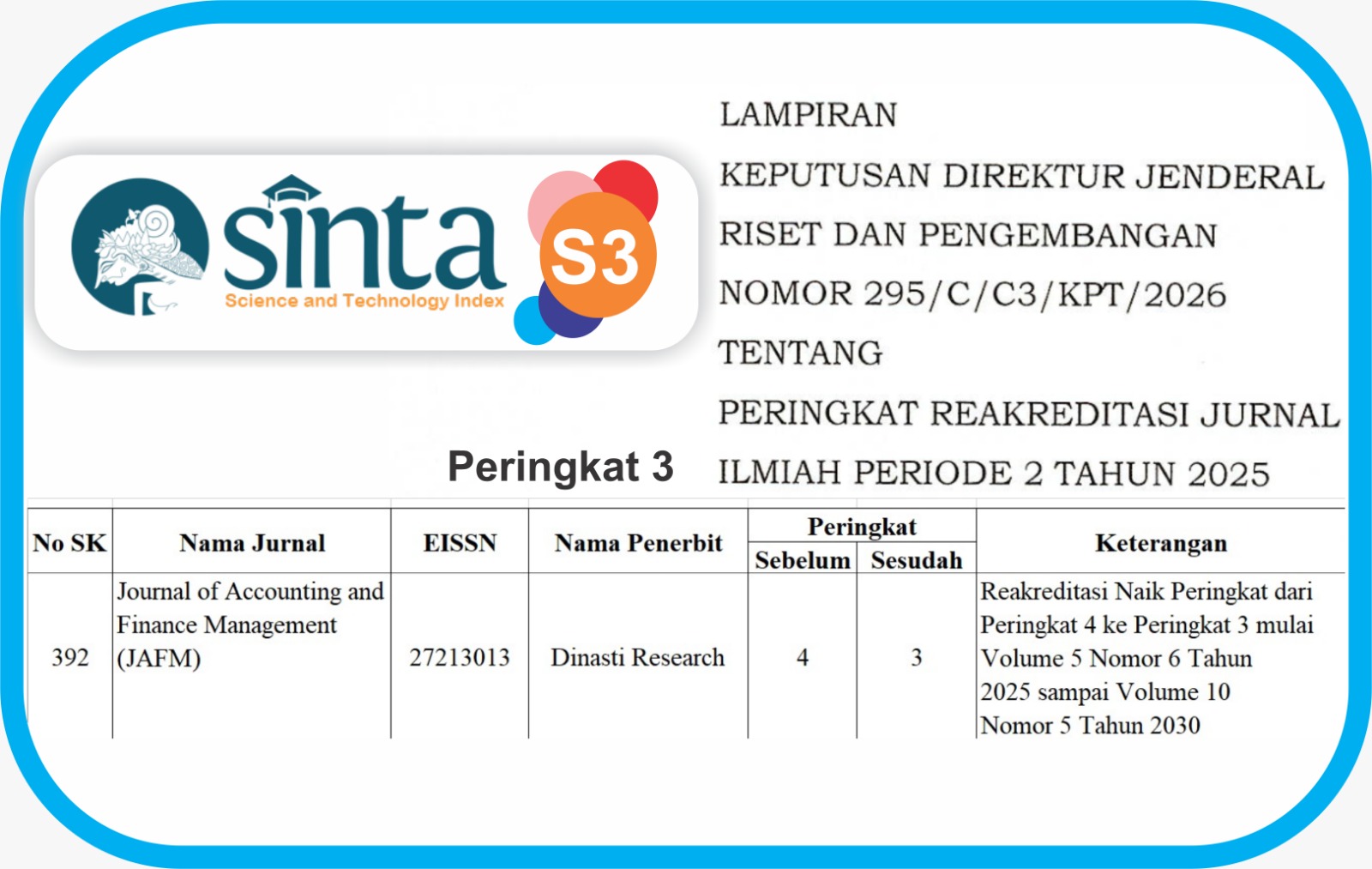Pengaruh E-Trust dan E-WOM Terhadap Customer Satisfaction Dengan Customer Loyalty Sebagai Variabel Mediasi
DOI:
https://doi.org/10.38035/jafm.v6i1.1694Keywords:
E-Trust, E-WOM, Customer Satisfaction, Customer LoyaltyAbstract
Pesatnya perkembangan e-commerce di Indonesia telah mendorong perubahan perilaku konsumen dalam mengambil keputusan pembelian. Kepercayaan terhadap platform (E-Trust) dan ulasan dari pelanggan lain (Electronic Word-of-Mouth atau E-WOM) menjadi faktor penting yang memengaruhi kepuasan dan loyalitas pelanggan. Penelitian ini bertujuan untuk menganalisis pengaruh E-Trust dan E-WOM terhadap Customer Satisfaction dengan Customer Loyalty sebagai variabel mediasi. Penelitian ini menggunakan pendekatan kuantitatif dengan metode Partial Least Square-Structural Equation Modeling (PLS-SEM) yang diolah melalui software SmartPLS versi 4.0. Data dikumpulkan dari 233 responden yang memiliki pengalaman berbelanja secara online. Hasil penelitian menunjukkan bahwa E-Trust dan E-WOM berpengaruh positif dan signifikan terhadap Customer Satisfaction. Selain itu, Customer Loyalty terbukti memediasi hubungan antara E-Trust dan E-WOM terhadap Customer Satisfaction. Temuan ini menunjukkan bahwa semakin tinggi tingkat kepercayaan dan ulasan positif yang diterima pelanggan, maka semakin tinggi pula kepuasan dan loyalitas yang terbentuk. Penelitian ini memberikan implikasi bagi pelaku e-commerce untuk memperkuat strategi pemasaran berbasis kepercayaan dan pengalaman pelanggan guna mempertahankan loyalitas dan meningkatkan kepuasan konsumen.
References
Ahmad, N., Harun, A., Rashid, N. K., Othman, B., Khizer, M. U., & Khan, S. (2020). The effect of e-WOM, perceived value, trust on online consumer behavioral intention: perspective of consumer from Pakistan. International Journal of Psychosocial Rehabilitation, 24(5), 7784-7796.
Ali, R., Wahyu, F. R. M., Darmawan, D., Retnowati, E., & Lestari, U. P. (2022). Effect of Electronic Word of Mouth, Perceived Service Quality and Perceived Usefulness on Alibaba’s Customer Commitment. Journal of Business and Economics Research (JBE), 3(2), 232–237. https://doi.org/10.47065/jbe.v3i2.1763
Gajewska, T., Zimon, D., Kaczor, G., & Madzík, P. (2020). The impact of the level of customer satisfaction on the quality of e-commerce services. International Journal of Productivity and Performance Management, 69(4), 666-684.
Ghozali, I., & Chariri, A. (2016). Teori Akuntansi Internasional Financial Reporting Systems (IFRS).
Ghozali. (2018a). Aplikasi Statistik untuk penelitian. Badan penerbit Universitas Negeri Semarang.
Ghozali. (2021). Partial Least Square konsep, Teknik dan Aplikasi menggunakan program SmartPLS 3.2.9 untuk penelitian empiris (3rd ed). Badan Penerbit Universitas Diponegoro.
Ginting, Y. M., Chandra, T., & Yusriad. (2023). Repurchase intention of e-commerce customers in Indonesia: An overview of the effect of e-service quality, e-word of mouth, customer trust, and customer satisfaction mediation. International Journal of Data and Network Science 7, 329-340.
Haghkhah, A., Rasoolimanesh, S. M., & Asgari, A. A. (2020). Effects Of Customer Value And Service Quality On Customer Loyalty: Mediation Role Of Trust And Commitment In Business-To-Business Context. Management Research & Practice, 12(1).
Hair Jr, J. F., Black, W. C., Babin, B. J., & Anderson, R. E. (2014). Multivariate Data Analysis (7th Edition). Essex: Pearson.
Hendrawan, G. M., & Agustini, M. Y. D. H. (2021). The Mediating Effect of e-Satisfaction and Trust on the Influence of Brand Image and e-Loyalty. Journal of Management and Business Environment (JMBE), 3(1), 10. https://doi.org/10.24167/jmbe.v3i1.3307
Jenneboer, L., Herrando, C., & Constantinides, E. (2022). The impact of chatbots on customer loyalty: A systematic literature review. Journal of theoretical and applied electronic commerce research, 17(1), 212-229.
Khalid, J., Abbas, A., Akbar, R., Mahmood, M. Q., Tariq, A., Khatoon, M., & Din, M. J. U. (2020). Significance of electronic word of mouth (e-wom) in opinion formation. International Journal of Advanced Computer Science and Applications, 11(2).
Lesmana, A., & Balqiah, T. E. 2023. Enhancing Customer E-Loyalty and E-WOM: The Role of Electronic and Non-Electronic Service Quality and Customer Satisfaction (PLN Mobile Application). Petra International Journal of Business Studies, 6(2).
Naveed Ahmad, Amran Harun, Nian Kamal Rashid, Bestoon Othman, Hafiz Muhammad Usman Khizer, & Shumaila Khan. (2020). The Effect Of E-WOM, Perceived Value, Trust On Online Consumer Behavioral Intention: Perspective Of Consumer From Pakistan. International Journal of Psychosocial Rehabilitation, 24(05). https://www.researchgate.net/publication/342515385_The_Effect_of_eWOM_Perceived_Value_Trust_on_Online_Consumer_Behavioral_Intention_Perspective_of_Consumer_from_Pakistan
Nguyen, L., Nguyen, T. H., & Tan, T. K. P. (2021). An empirical study of Customers' satisfaction and repurchase intention on online shopping in Vietnam. The Journal of Asian Finance, Economics and Business, 8(1), 971-983.
Radiansyah, E. (2022). The Role of Message, Sender, and Receiver in E-WOM: A Literature Review. Strategic Alliance Between, 236.
Riefky, M., & Hamidah, W. N. (2019). Pemodelan SEM PLS pada Faktor-Faktor yang Mempengaruhi Kepuasan Layanan Mahasiswa Fakultas Ekonomi UNIPA Surabaya. SNHRP-II UNIPA Surabaya, 6, 1260–1272.
Tran, G. A., & Strutton, D. (2020). Comparing email and SNS users: Investigating e-trustscape, customer reviews, trust, loyalty and e-wom. Journal of Retailing and Consumer Services, 53, 101782.
ZA Bulut. (2015). Determinants of repurchase intention in online shopping: A Turkish consumer’s perspective. International Journal of Business and Social Science, 6(10), 55–63.
Zahara, A. N., Rini, E. S., & Sembiring, B. K. F. (2021). The Influence of Seller Reputation and Online Customer Reviews towards Purchase Decisions through Consumer Trust from C2C E-Commerce Platform Users in Medan, North Sumatera, Indonesia. International Journal of Research and Review, 8(2).
Downloads
Published
How to Cite
Issue
Section
License
Copyright (c) 2025 Refita Ayu Kumala Dewi, Sri Padmantyo

This work is licensed under a Creative Commons Attribution 4.0 International License.
Authors who publish their manuscripts in this journal agree to the following conditions:
- The copyright on each article belongs to the author(s).
- The author acknowledges that the Journal of Accounting and Finance Management (JAFM) has the right to be the first to publish with a Creative Commons Attribution 4.0 International license (Attribution 4.0 International (CC BY 4.0).
- Authors can submit articles separately, arrange for the non-exclusive distribution of manuscripts that have been published in this journal into other versions (e.g., sent to the author's institutional repository, publication into books, etc.), by acknowledging that the manuscript has been published for the first time in the Journal of Accounting and Finance Management (JAFM).



























